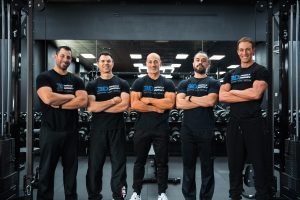One of my least favorite memories from my childhood was moving on a frequent basis. I forget the exact count, but I believe I went to total of 11 different schools growing up. This often came with a full relocation of residence, so I was not only the new kid at school, but also on the block. Not the most comfortable of things at the time, but these experiences shaped my persona immensely. For the most part I was well received as a child, and I was often the one kid everyone referred to as their best friend. I wasn’t a pushover, and I don’t consider myself the most agreeable person in the world, but I made this happen because I was a sound and open listener and speaking a person’s language back to them. These skills I was forced to develop made moving and starting over a bit easier, and fast forward to today, it helps me excel at what I do.
Want to know something funny? And I’ve seen this when my athletes meet each other: if you take a few of my clients and have them describe me and how I coach, the answers would be quite different from one another. The differences might almost be to the point you would think they couldn’t be talking about the same person. It’s not that they are interacting with an imposter, but rather, when you take the time to really listen to someone, it should impact how you correspond with them. Beyond what they ask for, what they need, what their insecurities are, and what aspects of their journey they feel are their purview and which are the coaches, other variables like how they say things and their tone of voice influence how you should coach. Seriously, body language is such a huge cue for me that I insist my athletes use video summaries for their check-ins. I work with athletes all over the world, so taking their culture into account is also an important factor. Even within the US, there are enough cultural variations that you have to take culture into account when “chopping it up” with your athletes. For example, I wouldn’t call it “chopping it up” if I was talking with my client Bertha from Montana. An athlete’s athletic history also changes the dynamics of how you communicate with them. “Coaching up” (lingo for instructional hard love and encouragement) Earl, who was a stud football player in Texas, is going to look very different compared to how I coach up Bertha, who didn’t even start lifting until her 40thbirthday. If you take a second and consider all these aspects of what makes a person who they are, and how they communicate and perceive the world, it makes sense that the “coaching delivery system” should be unique to each of your clients.
You can have the best programming and nutritional know-how in the world, but it won’t be nearly as effective in the long term if you don’t create a comfortable environment for your athletes. To be fair, your athletes are also partly responsible for creating this environment. But, as the lead facilitator of this relationship, you take the brunt of responsibility in creating this environment. Over time, your strategies should evolve and improve, but you have to remember that people aren’t numbers on paper. If you don’t seek to improve how you communicate, you will never be able to maximize your abilities as a coach, regardless of your knowledge. I wish I had a step by step guide on how to improve these soft skills, but I really don’t. However, I can say it’s something that should absolutely be on your radar, because if you aren’t aware of this being something of import in the first place, there is no chance you’ll improve it. Communication is so important, that I truly believe a coach lacking in the methodology department (but who is still fundamentally sound) will consistently outperform a coach who is a human encyclopedia of knowledge and a veritable AI algorithm when it comes to modifying the X’s O’s, but who lacks communication skills.
So, I leave you with that, and while many of us inherently know the importance of good communication, I just don’t feel it is something coaches actively attempt to improve as aggressively as they should. The added buy-in created by a comfortable coaching environment will absolutely change your bottom-line for the better. To me, you can’t even call it coaching if a proper relationship isn’t formed during the process. Again, I don’t have a “how to guide” but the great thing is, everything you need to know is right there, if you just listen!

Good evening,
My name is Antonis Zavros and i am a PhD student from Cyprus.
I would like to ask if you know a good software (free or one payment) which can help me with the designing of the diet. I found food exchanges not so practical. I am looking for a software which is using the USDA database and can calculate total macros percentage and percentage for every meal.
Thanks in advance